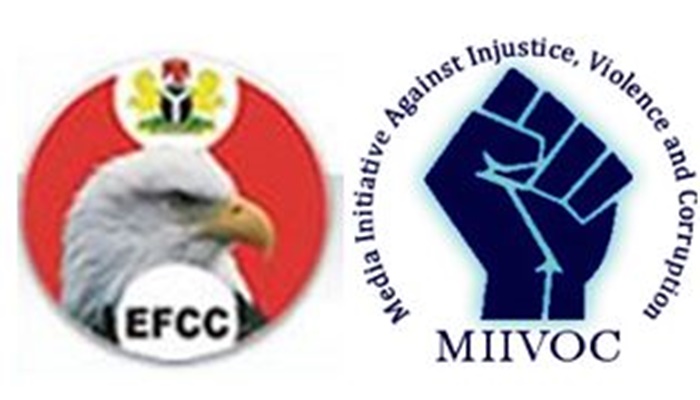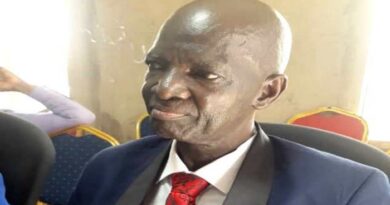Civil society roundtable mandates FG, agencies on public opinion
The Civil society roundtable on anti-corruption bills, with the theme: Strengthening Nigeria’s Anti-Graft War through Credible Legislation, which was held in Abuja, from 3rd to 4th November, 2016 has called on the President and heads of anti-corruption agencies to be sensitive and responsive to public opinion on the administration’s approaches to the anti-corruption war in other to enlist and enjoy public confidence and support and to enhance the legitimacy of the anti-corruption crusade
The roundtable organised by the Media Initiative against Injustice, Violence and Corruption (MIIVOC) with support from Justice for All (DFID) as part of its recommendations after the deliberations also said that the anti-corruption war should be prosecuted comprehensively without fear or favour as only a credible and result oriented fight which it said would guarantee public support and ensure that the commonwealth is made available to promote national development and serve the wellbeing of all Nigerians rather than the narrow and selfish interest of the privileged minority elites.
That the on-going war against corruption needs to be prosecuted with respect for the Constitution and laws of the country, and without fear or favour and that the government should commit to the speedy passage of anti-corruption bills which it said will facilitate the fight, with a focus not only to securing convictions but also ensuring the recovery and accountable use of recovered assets for common good as well as the protection of whistle blowers.
It further recommended that the fight against corruption be made more effective by strengthening the legal framework guiding the process through expeditious passage of all relevant new or pending bills into law; some of these Bills were passed by the 7th National Assembly, but not assented to by the President. Such Bills include POCA, NFIC, WBP and MA Bills.
It also recommended that the civil society must unite, remain focussed and consistent, acquaint themselves with the contents and purpose of the Bills and collectively and constructively engage with both the executive and the legislature in the effort to see to the passage of these Bills; That Civil society should also be creative in cultivating principled relationships with members of the NASS without being partisan or co-opted.
“The role of the media in the fight against corruption is very crucial and Civil society must involve the media at every stage of the advocacy planning for their buy-in and effective dissemination of information and mobilisation of public opinion in favour of the Bills and the anti-corruption crusade in general.
“It also recommended that Nigerians should take deliberate steps to hold anti-corruption agencies, as well as public office holders accountable.
The coalition, as part of its eight-point communiqué, described as a welcome development the resolve of the Federal Government to more vigorously to combat corruption and ensure that the commonwealth is committed to promoting national development and serving public interest and the wellbeing of all Nigerians rather than the narrow and selfish interest of the privileged minority elites.
It, however, lamented that despite enormous efforts and resources committed to the fight against corruption, it has been more of motion without movement, sound and fury without the expected significant impact, as the number of convictions recorded and assets recovered so far is not proportionate to the enormity of efforts and the propaganda accompanying it, while the few recovered assets are not deployed to serve public interest or even satisfactorily accounted for.
According to the body, “whistle blowers and witnesses have remained endangered species in their patriotic efforts to contribute to the fight against corruption by reporting and exposing corruption; there is no legislation to protect whistle blowers and witnesses whose contributions to the fight against corruption are significant.”
Participants noted the widespread feelings and opinion that the on-going war against corruption is not comprehensive, and that it appears to target only a few rather than every corrupt persons and institutions in Nigeria and that there is a tendency to rationalise the side-tracking of the rule of law in the fight against corruption.
They further noted the role of certain institutions and sectors, particularly, the banking sector in sabotaging and frustrating the fight against corruption by continuing to collude with corrupt persons in public and private sectors, and serving as conduits for illicit transactions and, siphoning and transfer of looted funds.
It further pointed out that the legal framework for anti-corruption remains weak , making the anti-crime war more difficult and cumbersome and the efforts of civil society towards the passage of certain Bills such as POCA, NFIC, WBP and MA Bills which will facilitate the fight against corruption have been hampered.
Another highlight of the communiqué is that civil society community has not been united in effort around the passage of the bills; lack adequate knowledge of the contents and purpose of the Bills; and of law making processes, hampering constructive and effective engagement with the executive, legislature and other key stakeholders in the efforts to secure the passage of these Bills.
It pointed out that the media have not been effectively involved and utilised for the dissemination of provisions in the bills and, mobilisation of public opinion in favour of the anti-corruption Bills and the anti-corruption crusade.
The communiqué was signed by Okechukwu Nwanguma- Chairman, Communique drafting Committee/ Network on Police Reforms in Nigeria- NOPRIN; Walter Duru, Media Initiative against Injustice, Violence and Corruption-MIIVOC; Lanre Suraj, Civil Society Network against Corruption- CSNAC; Eze Eluchie, PADDY Foundation; Emeka Ononammadu, Citizens Center for Integrated Development and Social Rights; Okoye Jacinta, Human Rights Writers Association (HURIWA); Charles Erabor, Africa Network for Environment and Economic Justice- ANEEJ; Ozor Ugonna Kingsley, Development Measures; Anthony Ehilebo , Breaking Times; Olukayode Senbanjo, Confluence of Rights Nigeria; Patricia Samuels, Proactive Gender Initiatives; Nelson Nnanna Nwafor, Foundation for Environmental Rights, Advocacy and Development; Peter Oris, Business Advocacy Group; Celestine Okeke, Micro Small Medium Enterprises Advocacy and Support Initiative; Don Morris Ovia, Rural People Network; Nicholas Kalu, The Nation; Bassey Inyang, This Day and Kingsley Opurum, Watch Dog News.




